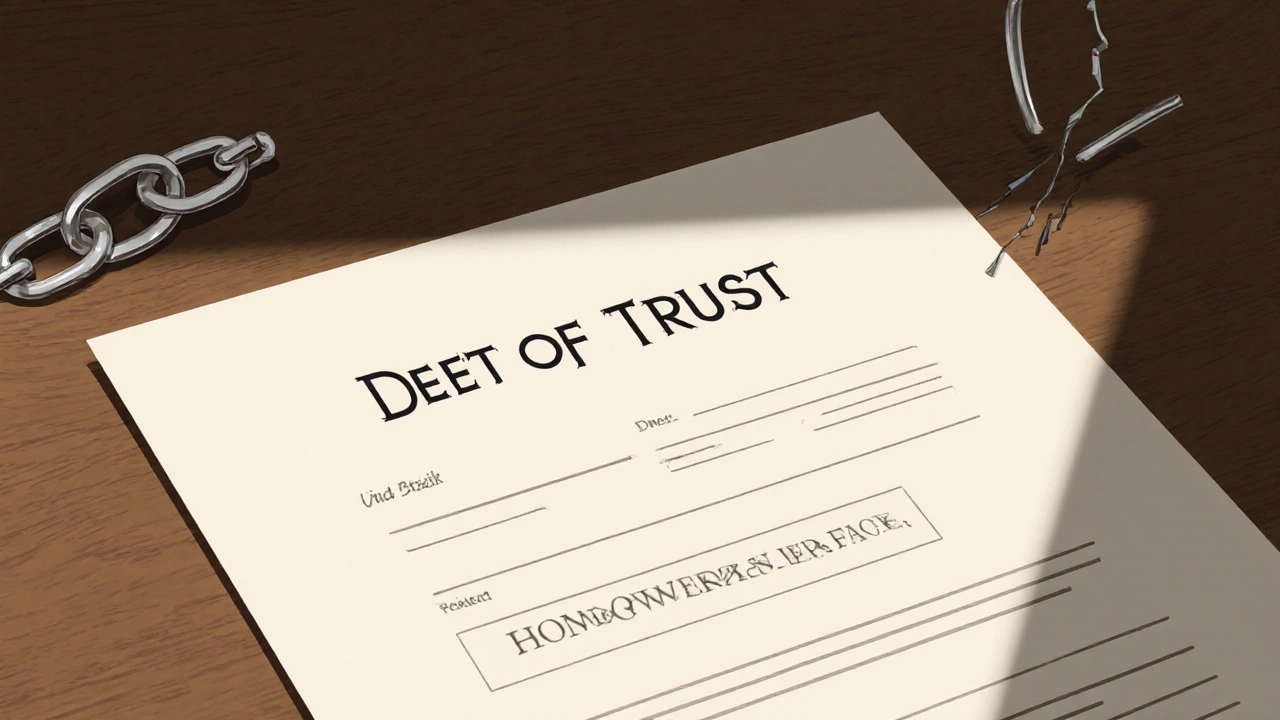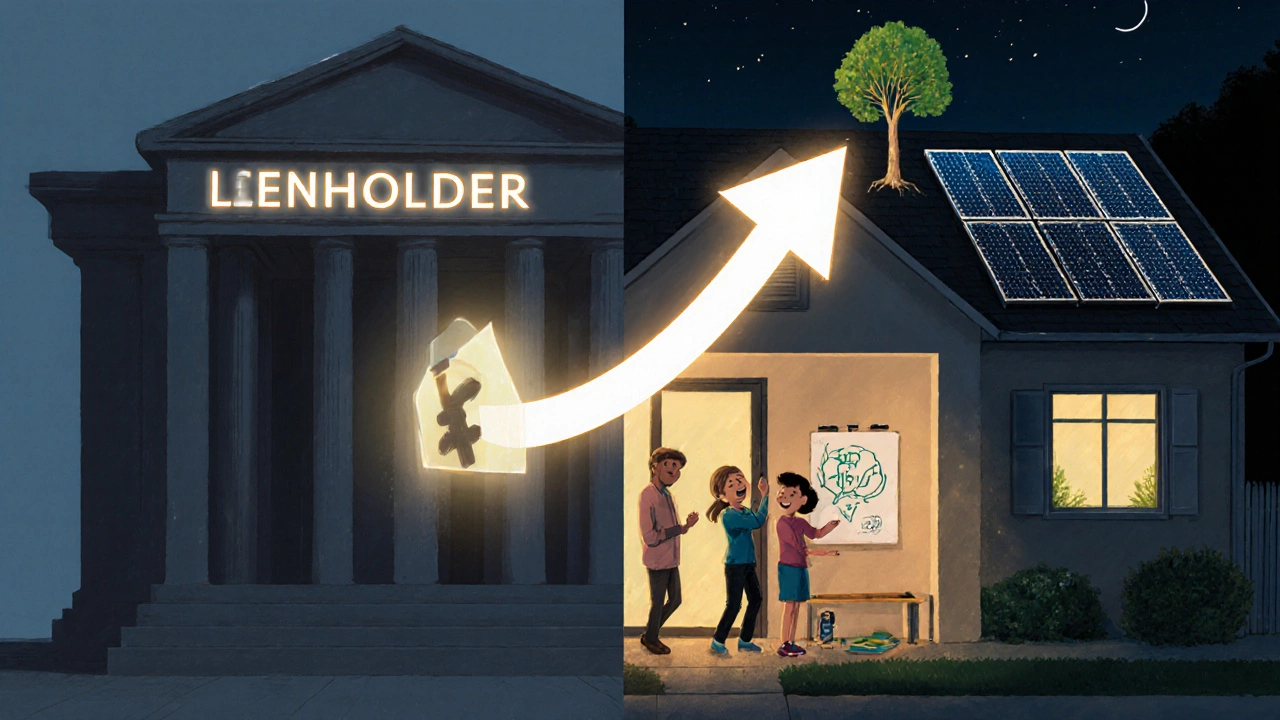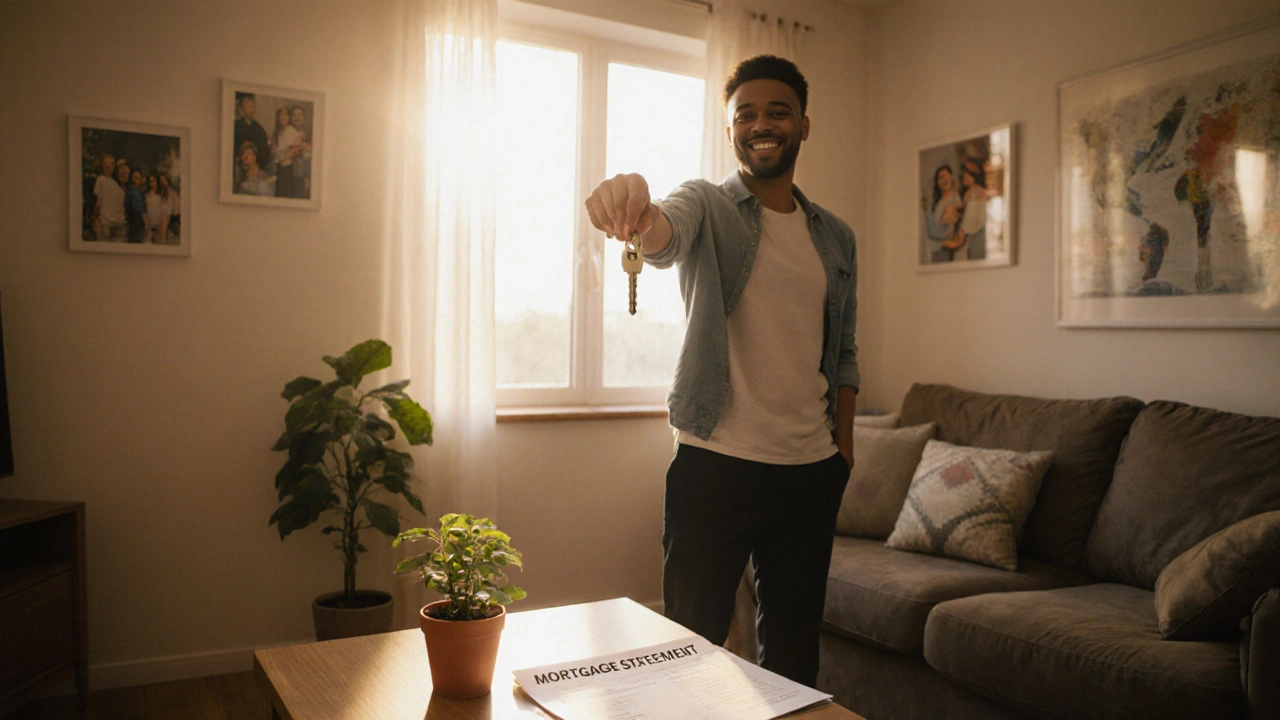You signed the papers. You made the down payment. You’ve been paying your mortgage every month for years. So why does it still feel like someone else owns your house? The truth is, you are a homeowner-even with a mortgage. But the confusion isn’t silly. It comes from how the system is built. Banks don’t just lend money. They hold a legal claim on your home until you pay them back. That doesn’t mean they own it. It means they have a safety net.
What Does Ownership Really Mean?
Ownership isn’t about having full, unrestricted control from day one. It’s about having the legal right to use, sell, or pass on a property. In the U.S., when you buy a home with a mortgage, you get the title. That’s your proof of ownership. The lender records a lien on that title. A lien is a claim, not a takeover. Think of it like borrowing a car from a friend who keeps the keys until you pay them back. You still drive it, fix it, park it where you want. They just hold the title until you’re done.
The same thing happens with your home. You can paint the walls, install a new kitchen, or put up a fence. You pay the property taxes. You get the insurance checks if something breaks. You decide who lives there. The bank doesn’t get a say in any of that. Their only power is to step in if you stop paying. That’s foreclosure-not ownership.
How the Mortgage System Works
When you close on a house, two big documents are signed: the promissory note and the deed of trust (or mortgage, depending on your state). The promissory note is your IOU. It says you promise to repay the loan with interest. The deed of trust gives the lender the right to sell the house if you default. But the deed-the official record of ownership-is in your name. You’re listed as the grantee. The lender is the beneficiary.
This isn’t just legal jargon. It’s how the system protects both sides. You get to live in and build equity in the home. The lender gets security. If you skip payments, they can take the house and sell it to recover their money. But until then, you’re the owner. The bank doesn’t live there. They don’t pay the utilities. They don’t get the tax breaks. You do.
What Happens When You Pay Off the Mortgage?
Once your final payment clears, the lender is legally required to release the lien. They’ll send you a satisfaction of mortgage document. You file this with your county recorder’s office. After that, your title is clean. No more claims. You own the property outright.
Some people think this changes their status from "homeowner with a mortgage" to "true homeowner." But that’s misleading. You were always the homeowner. You just removed a claim against your title. Think of it like paying off a car loan. You didn’t become a car owner when you paid it off-you were already the owner. The lien was just a temporary hold.
Why People Get Confused
The confusion comes from language. Banks say things like, "We own the mortgage," or "We hold the title." That’s not the same as owning the house. They own the loan. They hold a security interest. The actual title-your legal right to the property-is yours.
Also, when you get your first mortgage statement, it lists the lender as the "lienholder." That sounds scary. But it’s just standard terminology. It’s like a mechanic saying, "I’m holding your car until you pay for the repair." They’re not stealing it. They’re protecting their payment.
And then there’s the emotional side. You’re handing over a big chunk of your income every month. It feels like you’re renting. But rent means you don’t build equity. You don’t get tax deductions. You don’t get to sell and pocket the profit. With a mortgage, you do all of that. That’s ownership.

What You Can and Can’t Do as a Homeowner with a Mortgage
As the legal owner, you have broad rights:
- You can renovate or remodel (unless your HOA says otherwise)
- You can rent out rooms or the whole house (check your loan terms-some loans restrict this)
- You can leave the property to someone in your will
- You can sell it at any time-even if you still owe money
But there are limits:
- You must keep insurance. The lender requires it to protect their interest.
- You must pay property taxes. If you don’t, the government can seize the house-even before the bank can.
- You can’t ignore the loan terms. Some loans have prepayment penalties or require you to live in the home for a year.
These aren’t restrictions on ownership. They’re conditions tied to the loan. Just like you can’t drive a rented car without insurance, you can’t keep a mortgaged home without meeting those requirements.
What Happens If You Die With a Mortgage?
Many people worry that their family will lose the house if they pass away. That’s not how it works. The mortgage doesn’t disappear. But neither does the ownership. Your estate inherits the home-and the debt. Your heirs can:
- Keep paying the mortgage and keep the house
- Sell the house and use the money to pay off the loan
- Let the lender foreclose if they can’t or won’t pay
The bank doesn’t take the house automatically. They don’t get to decide who lives there. Your will or state law determines who inherits it. The lender only steps in if payments stop.
Real-World Example: Sarah’s Story
Sarah bought a three-bedroom home in Austin in 2021 with a 30-year mortgage. She put down 10%. Her monthly payment was $1,850. Two years later, she refinanced to a 15-year term. She’s now paying $2,400 a month-but she’s built over $70,000 in equity. She rented out her basement for $900 a month. She used that money to install solar panels. She’s on track to own the house free and clear by 2036.
Did the bank own her home? No. Did they have a claim on it? Yes. But Sarah made all the decisions. She chose the renovations. She picked the tenant. She handled the taxes. She’s the homeowner. The lender was just a partner in the financing, not the property.

Myths About Mortgages and Ownership
Here are the most common lies people believe:
- Myth: "The bank owns my house." Truth: They own a lien. You own the property.
- Myth: "I’m just renting until I pay it off." Truth: Renters don’t get tax deductions, equity, or resale profits.
- Myth: "If I miss one payment, they take it." Truth: Foreclosure takes months, often over a year. You get notices, options, and chances to fix it.
- Myth: "I’m not a real homeowner until I own it free and clear." Truth: You’ve been a homeowner since day one. You just had a loan attached to it.
These myths aren’t just wrong-they make people feel powerless. But you’re not powerless. You’re the owner. The mortgage is just a tool.
Why This Matters
Understanding this isn’t just about feeling better about your home. It’s about making smart decisions. If you think the bank owns your house, you might avoid selling it, even when it makes financial sense. You might skip repairs because you think "it’s not really mine." You might not plan your estate properly, assuming the bank will take everything.
Knowing you’re the owner means you can:
- Use your equity to fund a business or education
- Plan for inheritance with confidence
- Renegotiate or refinance without guilt
- Walk away from a bad deal if you need to
Ownership gives you power. A mortgage doesn’t take that away. It just adds a condition.
Final Answer: Yes, You’re a Homeowner
You are a homeowner. Not "almost." Not "sort of." Not "technically." You are. The mortgage is a financial arrangement, not a transfer of ownership. The title is in your name. The taxes are in your name. The repairs are your responsibility. The profits are yours.
It’s okay to feel uneasy about the monthly payments. It’s okay to wish you owned it outright. But don’t let that make you doubt your status. You built this. You paid for it. You live in it. That’s what makes you a homeowner.
Can I sell my house if I still have a mortgage?
Yes, you can sell your house at any time-even if you still owe money on the mortgage. When the sale closes, the proceeds first go to pay off your remaining loan balance. Any leftover money is yours to keep. This is how most homeowners move up to bigger homes or relocate. Lenders don’t block sales; they just get paid first.
Does having a mortgage affect my credit score?
Yes, but positively-if you pay on time. A mortgage is a type of installment loan, and having one on your credit report can improve your credit mix, which makes up 10% of your FICO score. Consistent, on-time payments build trust with lenders. Missing payments, however, will hurt your score badly and can lead to foreclosure.
Can I refinance if I’m not a "true" homeowner?
You don’t need to be a "true" homeowner to refinance-you just need equity and good credit. Most lenders require at least 20% equity in your home to refinance without private mortgage insurance. Since you’re the legal owner with a title in your name, you qualify for refinancing just like anyone else. In fact, refinancing is one of the most common ways homeowners lower payments or pull out cash.
What happens if I lose my job and can’t pay the mortgage?
You don’t automatically lose your home. Lenders prefer to work with you. Options include loan modification, forbearance (temporarily pausing payments), or a repayment plan. Federal programs like the Home Affordable Modification Program (HAMP) still exist in some forms, and many states offer housing counseling. The key is to contact your lender before you miss a payment. Waiting makes things harder.
Is it better to pay off my mortgage early?
It depends. Paying off your mortgage early gives you peace of mind and frees up monthly cash. But you lose the mortgage interest tax deduction (if you itemize), and you might miss out on better returns by investing that money elsewhere. For example, if your mortgage rate is 4% and your investment portfolio averages 7%, you’re better off investing. But if you hate debt or want guaranteed security in retirement, paying off the mortgage makes sense.

